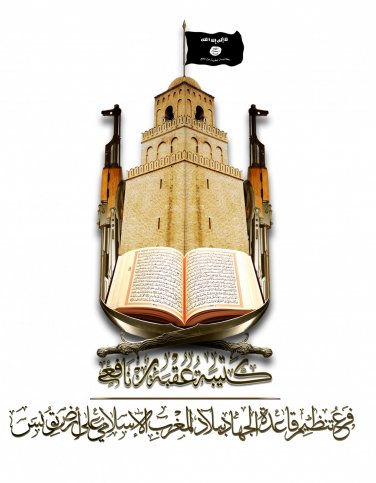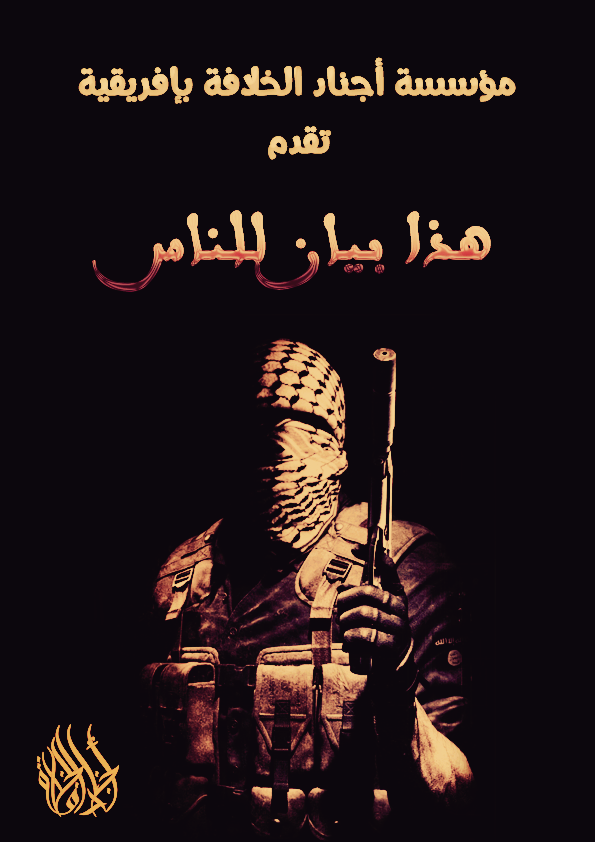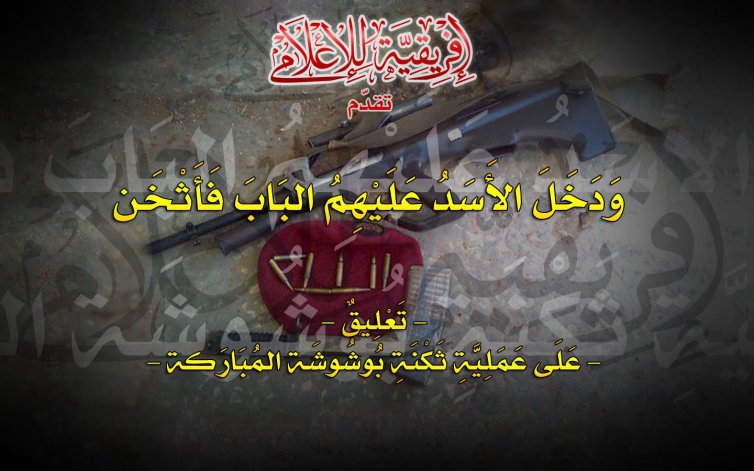Click here for the first part.
—

Click the following link for a safe PDF copy: Abū Labābah al-Tūnisī — “Series About the Causes of the Spread of Extremism in the Tunisian Youth- Why Are Tunisia’s Youth the Most Extreme in the Ranks of the State Organization?, Parts 2, 3, 4″
________________
To inquire about a translation for this article for a fee email: [email protected]
Category: Tunisia
New article from Abū Labābah al-Tūnisī: "Series About the Causes of the Spread of Extremism in the Tunisian Youth, Part 1: Why Are Tunisia's Youth the Most Extreme in the Ranks of the State Organization?"

Click the following link for a safe PDF copy: Abū Labābah al-Tūnisī — “Series About the Causes of the Spread of Extremism in the Tunisian Youth, Part 1- Why Are Tunisia’s Youth the Most Extreme in the Ranks of the State Organization?”
_________________
To inquire about a translation for this article for a fee email: [email protected]
New statement from Katībat 'Uqbah Ibn Nāfi': "So Wait; Indeed We, Along With You, Are Waiting"
The title of this release is in reference to Qur’anic verse 9:52. Here it is in full: “Say, ‘Do you await for us except one of the two best things while we await for you that God will afflict you with punishment from Himself or at our hands? So wait; indeed we, along with you, are waiting.'”
—

Click the following link for a safe PDF copy: Katībat ‘Uqbah Ibn Nāfi’ — “So Wait; Indeed We, Along With You, Are Waiting”
_________________
To inquire about a translation for this statement for a fee email: [email protected]
Check out my Congressional Testimony for the Foreign Affairs Committee's Subcommittee on the Middle East and North Africa: "Tunisia’s Fragile Democratic Transition"

Thank you, Madam Chairwoman and members of the committee, for giving me the opportunity to testify today on Tunisia’s transition since its election late last year — in particular focusing on the jihadi threat to it and the Tunisian and American governments’ policies in dealing with the problem. Currently, there are two main groups that are attacking the Tunisian state: an al-Qaeda in the Islamic Maghreb cut-out called Katibat Uqba ibn Nafi (KUIN), mainly based in Jebel Chaambi on the western border with Algeria, and the Islamic State, which has a safe haven in Libya as well as cells inside of Tunisia.
Background on Terrorism-Related Activity and Actions in Response
Since the presidential elections, there have been a number of terrorism-related activities and actions taken in response inside of Tunisia. There have been eleven publicly known terrorist attacks either claimed or believed to be conducted by KUIN and the Islamic State since December 1, 2014. In response to this as well as proactive measures done by the state, there have been twenty-one occasions of arrests of those suspected of planning attacks or being connected to attacks that had already occurred. In addition to terrorist attacks and arrests, the Tunisian military has also been involved in offensive and defensive operations against insurgents ten times in this time span. This illustrates that the threat from jihadis is very real, but also that the Tunisian state has been quite proactive in attempting to stem any more attacks whether in the form of terrorism or insurgent activity.
Click here to read the full nine-page written testimony.
New statement from Ifrīqīyyah al-Muslimah: "The Knight Abū Fataḥ Dismounts After a Long Jihād: Condolences on His Death and His Brothers Upon the Land of Tunisia"

Click the following link for a safe PDF copy: Ifrīqīyyah al-Muslimah — “The Knight Abū Fataḥ Dismounts After a Long Jihād- Condolences on His Death and His Brothers Upon the Land of Tunisia”
_________________
To inquire about a translation for this statement for a fee email: [email protected]
New statement from Ajnād al-Khilāfah bi-Ifrīqīyyah Media Foundation: "This is a Declaration For the People"

Click the following link for a safe PDF copy: Ajnād al-Khilāfah bi-Ifrīqīyyah Media Foundation — “This is a Declaration For the People”
_______________
To inquire about a translation for this statement for a fee email: [email protected]
Check out my new ‘Insight’ for the International Centre for the Study of Radicalisation and Political Violence: "The Tunisian-Libyan Jihadi Connection"

It should have come as no surprise that Seifeddine Rezgui, the individual that attacked tourists in Sousse, Tunisia more than a week ago, had trained at a camp in Libya. The attack represented the continuation of a relationship between Tunisian and Libyan militants that, having intensified since 2011, goes back to the 1980s. The events in Sousse are a stark reminder of this relationship: a connection that is set to continue should The Islamic State (IS) choose to repeat attacks in Tunisia in the coming months.
Brief History on the Tunisian-Libyan Militant Nexus
Although Ennahda did not explicitly call for individuals to fight against the Soviets during the Afghan jihad, they were regularly involved in facilitation and logistical networks that brought Libyans to the region. Additionally, according to Noman Benotman, a former shura council member of the Libyan Islamic Fighting Group (LIFG) in Afghanistan in the 1980s, Libyans alongside Abdul Rasul Sayyaf, the Afghan leader of Ittihad-e-Islami, attempted to help the Tunisians create their own military camp and organization. This would not come to fruition until 2000, when future leaders of Ansar al-Sharia in Tunisia (AST), Tarek Maaroufi (based in Brussels) and Sayf Allah Bin Hassine (moved from London to Jalalabad, Afghanistan; also known as Abu Iyadh al-Tunisi) co-founded the Tunisian Combatant Group.
Following the Afghan jihad, many Ennahda members were exiled to Europe in the late 1980s and early 1990s, by former president Ben Ali. While some returned home, the committed were drawn to the jihadi and foreign fighter networks that had spread across Europe, especially in Milan, Italy. Milan became a central hub for recruitment, logistics, and facilitation of foreign fighters going to the Bosnian war as well as assisting the Armed Islamic Group (GIA) in the Algerian jihad. While the Egyptian, Anwar Sha’aban, led the network, the group surrounding him was made up largely of Tunisians and Libyans, with some Algerians and Moroccans, working together. This milieu helped build interesting relationships among the individuals, along with other cells in Europe. One in particular was between Sami Essid bin Khamis, a future leader of AST, and the Libyan Lased Ben Heni, who was based in Frankfurt, who worked together to plan the 2000 Strasbourg Cathedral Plot (along with the London Algerian jihadi network).
Following 9/11, the successor group to the GIA in Algeria was the Groupe Salafiste pour la Prédication et le Combat (GSPC; which would eventually become al-Qaeda in the Islamic Maghrib in 2007). In 2003, Nabil Sahrawi, the leader at the time, was attempting to regionalize the jihad beyond Algerian borders and emphasize recruitment from Tunisia and Libya. While the organization was still dominated by Algerians, the Tunisians and Libyans worked together in GSPC’s ‘Zone 5,’ which was close to the border with Tunisia and under the banner of El-Fatah El-Moubine. Because of this, there were a number of cases in the mid to late 2000’s where groups of Algerians, Tunisians, and Libyans would get arrested together, either on the Algerian or Tunisian side of their respective borders. In many ways, this formation was a precursor to the now AQIM splinter group, Katibat ‘Uqba ibn Nafi (KUIN) based in the Chaambi Mountains on the Tunisian-Algerian border. Around the same time, GSPC networks in Algeria and remnant LIFG networks in Libya were providing logistics and facilitation to fighters going to Iraq in the mid-2000s to fight with al-Qaeda (the precursor to IS). There were a number of routes that Tunisians took to get to Iraq, but one was through the Libyan support networks, which was a reversal of the 1980’s trend. Here many relationships were forged, which would be important after 2011 since a number of Iraq jihad veterans then became involved with AST, Ansar al-Sharia in Libya (ASL), and then eventually The Islamic State in Libya. One such case was Abu Radwan al-Tunisi, from Bizerte, who came to Iraq via Libya and eventually died fighting the Badr Brigades.
Click here to read the rest.
New release from Ajnād al-Khilāfah bi-Ifrīqīyyah Media Foundation: "'The Raid of al-Qanṭāwī': The State of Emergency: Enter Upon Them Through the Gate"
The latter part of this release title is in reference to Qur’anic verse 5:23. Here it is in full: “Said two men from those who feared [to disobey] upon whom God had bestowed favor, ‘Enter upon them through the gate, for when you have entered it, you will be predominant. And upon God rely, if you should be believers.'”
—

Click the following link for a safe PDF copy: Ajnād al-Khilāfah bi-Ifrīqīyyah Media Foundation — “‘The Raid of al-Qanṭāwī’- The State of Emergency- Enter Upon Them Through the Gate”
_______________
To inquire about a translation for this release for a fee email: [email protected]
New statement from Ifrīqīyyah Media: "A Quick Comment From the Front Line: Response to the New Lies of the Apostate Tunisia"

Click the following link for a safe PDF copy: Ifrīqīyyah Media — “A Quick Comment From the Front Line- Response to the New Lies of the Apostate Tunisia”
____________
To inquire about a translation for this statement for a fee email: [email protected]
New release from Ifrīqīyyah Media: "Blessed Operation Upon the Bouchoucha Military Barracks"

Click the following link for a safe PDF copy: Ifrīqīyyah Media — “Blessed Operation Upon the Bouchoucha Military Barracks”
______________
To inquire about a translation for this release for a fee email: [email protected]
